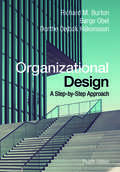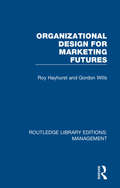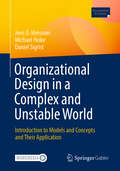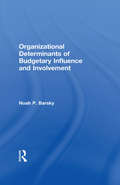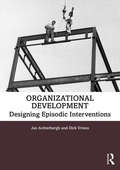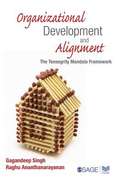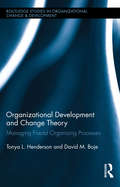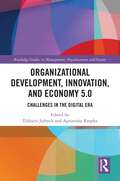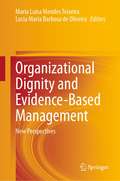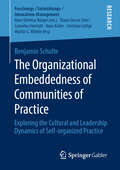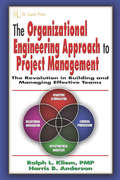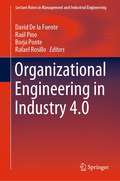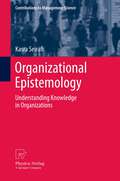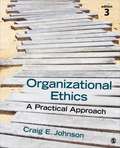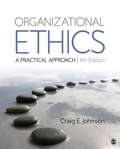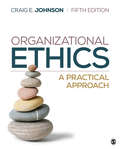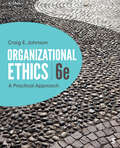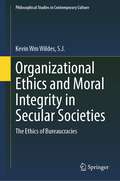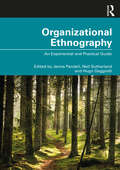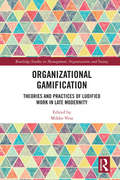- Table View
- List View
Organizational Design: A Step-by-Step Approach (Information And Organization Design Ser. #4)
by Richard M. Burton Børge Obel Dorthe Døjbak HåkonssonNow in its fourth edition, this is the definitive step-by-step 'how to' guide to designing an organization. Building on information processing theory, the book proposes a holistic, multi-contingency model of the organization. This textbook communicates the fundamentals of traditional and new organizational forms, including up-to-date analysis of self-organizing, boss-less, digital, and sustainable organizations. Providing a framework for the practical implementation of organizational design changes, the authors break the process down into seven basic steps: (1) Assessing Goals, (2) Assessing Strategy, (3) Analyzing Structure, (4) Assessing Process and People, (5) Analyzing Coordination, Control and Incentives, (6) Designing the Architecture, and (7) Implementing the Architecture. Each step connects with one of the nine interdependent components of the multi-contingency model, and the authors also provide a logical query process for approaching each of these components. This is an ideal guide for managers or executives interested in assessing their organization and taking steps to redesign it for success, as well as for MBA and executive MBA students looking for an introduction to organizational design.
Organizational Design for Marketing Futures (Routledge Library Editions: Management)
by Roy Hayhurst Gordon WillsThis study, originally published in 1972, presents a critical, in-depth survey of the organization of marketing activity in the United Kingdom. This report of practice in over 500 major British firms provides some enlightening information and allows certain objective bench-marks to be established for practical guidance. By analysing and presenting clearly the dynamics of organization structure, the authors seek to develop an understanding of marketing’s task within the business and its interaction with other aspects of the organization. The result in a catalyst to the realistic and profitable understanding of marketing development.
Organizational Design in a Complex and Unstable World: Introduction to models and concepts and their application
by Jens O. Meissner Michael Heike Daniel SigristOrganizations of all kinds create a sense of purpose and sometimes incomparable performance that individuals cannot achieve alone. This textbook examines the developments and changes that organizations should make in order to be successful in today's complex organizational environment. The authors explain various models and concepts of organizational design, highlight the important role played by agile management and self-organization and reflect on the consequences these concepts have for practical organizational work. The necessary organizational development can only be meaningfully and successfully implemented with consideration of the existing corporate culture and knowledge of the fundamentals of knowledge management, so these are also taught in the textbook. The overarching goal of organizational design is to promote the organization's resilience to crises. After laying the foundations for this, the penultimate chapter is dedicated to the aspect of resilience, followed by an outlook for the future. The didactic structure of the textbook includes learning objectives, practical examples and case studies as well as learning comprehension questions and the opportunity to test your own knowledge with the Springer Nature Flashcards. This textbook has been recommended and developed for university courses in Germany, Austria and Switzerland.
Organizational Determinants of Budgetary Influence and Involvement
by Noah P. BarskyDrawing on network theory from the organizational sociology literature, this book examines issues related to which organizational factors determine how employees influence the budgeting process. Data were collected from managers who participate in the budgeting process at a major apparel manufacturer. Social network analysis was employed to measure how the structure of the network of managers affects the budgeting process. The results show that budgetary influence is structurally determined and resides with managers holding central positions in the organizational network. Thus, while formal procedures determine which employees are involved in budgeting activities, only centrally positioned managers actually influence budgetary outcomes.The findings indicate that influence, not involvement, is the key to empowerment in the budgeting process. This research suggests that researchers and practitioners should be aware of an organization's social structure when examining a participative budgeting process. The difference between formal designs and actual influence is indicative of a "rhetoric-reality gap" which can impair the effectiveness of management control systems.
Organizational Development: Designing Episodic Interventions
by Dirk Vriens Jan AchterberghOrganizational Development gives readers an understanding of organizational structures and presents a new and easy-to-understand framework which describes the three dimensions of organizational interventions. Interventions in organization often fail. This has been widely acknowledged: many books exist about the topic and many approaches are proposed to guide organizational interventions – but to no avail – so it remains difficult to design and guide them. This is the first book to (1) provide readers with an understanding of organizational structures and why it is both relevant and difficult to change them, and (2) present a model consisting of three underlying dimensions of interventions. The authors describe how this model can be used to design interventions in organizational structures. Containing practical guidelines to show how interventions can be designed and controlled, this book should be considered essential reading for postgraduate students of organizational development, design, and change, and practitioners carrying out organizational development projects.
Organizational Development and Alignment: The Tensegrity Mandala Framework
by Gagandeep Singh Raghu AnanthanarayananOrganizational Development and Alignment: The Tensegrity Mandala Framework takes a close look at the underlying axioms of Organization Design and Alignment that have not only proliferated rigid structures and oppressive hierarchies, but also have rendered employees worldwide as mere instruments and dehumanized the organizational context. By looking at an organizational system as inherently a Tensegrity structure, an architectural paradigm vitalized by Buckminster Fuller, the book offers the reader insights into the dynamic tensions, role-holding, and dialog possibilities that pervade the modern organization across stakeholders such as investors, customers, employees and the ecology. By containing the organization as a 'Mandala', a dynamic force field with arrays of polarities and counter-pulls that burden the leadership, it explicates the various dilemmas that are contained within, and offers insights into design, policies, culture and role-effectiveness. The Tensegrity Mandala empowers the organization of today towards reflexivity and transformation. It serves as a blueprint for growth, organization development, dialog, and institutionalizing leadership.
Organizational Development and Alignment
by Gagandeep Singh Raghu AnanthanarayananOrganizational Development and Alignment: The Tensegrity Mandala Framework takes a close look at the underlying axioms of Organization Design and Alignment that have not only proliferated rigid structures and oppressive hierarchies, but also have rendered employees worldwide as mere instruments and dehumanized the organizational context. By looking at an organizational system as inherently a Tensegrity structure, an architectural paradigm vitalized by Buckminster Fuller, the book offers the reader insights into the dynamic tensions, role-holding, and dialog possibilities that pervade the modern organization across stakeholders such as investors, customers, employees and the ecology. By containing the organization as a 'Mandala', a dynamic force field with arrays of polarities and counter-pulls that burden the leadership, it explicates the various dilemmas that are contained within, and offers insights into design, policies, culture and role-effectiveness. The Tensegrity Mandala empowers the organization of today towards reflexivity and transformation. It serves as a blueprint for growth, organization development, dialog, and institutionalizing leadership.
Organizational Development and Change Theory: Managing Fractal Organizing Processes (Routledge Studies in Organizational Change & Development)
by David M. Boje Tonya HendersonThis book offers a fresh perspective on organizational development and change theory and practice. Building on their recent work in quantum storytelling theory and complexity theory, Henderson and Boje consider the implications of fractal patterns in human behavior with a view toward ethics in organization development for the modern world. Building on Gilles Deleuze and Felix Guattari’s (1987) ontology of multiple moving and intersecting fractal processes, the authors offer readers an understanding of how managing and organizing can be adapted to cope with the turbulence and complexity of different organizational situations and environments. They advocate a sustainable, co-creative brand of agency and introduce appropriate, simple tools to support organizational development practitioners. This book offers theory and research methods to management and organization scholars, along with praxis advice to practicing managers.
Organizational Development, Innovation, and Economy 5.0: Challenges in the Digital Era (Routledge Studies in Management, Organizations and Society)
by Agnieszka Rzepka Elżbieta JędrychThis edited collection comprehensively explores Economy 5.0, focusing on critical aspects such as organizational development, intellectual capital, soft agent dynamics, and agility. Through in-depth analysis, real-world case studies, and forward-looking perspectives, the book provides readers with practical insights into the challenges and opportunities that define contemporary organizations and skills that can be applied in different cultural and organizational contexts. The overarching goal is to empower individuals to thrive in the dynamic economic landscape of Economy 5.0 by promoting sustainable practices, fostering future-proof skill sets, encouraging ethical leadership, and inspiring innovative solutions. It addresses issues and trends that are universally relevant in today's globalized world, offering a multidisciplinary perspective that will make it valuable to researchers, academics, practitioners, and students in the fields of organizational development, management, innovation, sustainability, and ethical leadership.
Organizational Dignity and Evidence-Based Management: New Perspectives
by Maria Luisa Mendes Teixeira Lucia Maria Barbosa de OliveiraThis book discusses dignity in the organizational context. Combining diverse theoretical and methodological approaches, as well as empirical studies, this book examines the concept of dignity between organizations and a variety of stakeholders. Going beyond the traditional approach of the relationship between company and employees, and beyond the traditional perspective of human dignity in a Kantian or post-Kantian approach, this volume innovates by discussing dignity from different epistemic perspectives, bringing to the fore dignity, inserted in different organizational and cultural contexts. The volume is divided into five parts. The first part is dedicated to the concept of dignity in the organizational sphere (dignity inside organizations, dignity between organizations and their stakeholders, and dignity in business-to-business relationships) discussed under different epistemic approaches. The second part deals with dignity in the relationships between companies and employees. The third part deals with the relationship between companies and clients. The fourth part of the book studies business-to-business relationships, addressing the educational sector, restaurants, and microcredit. Finally, the fifth part focuses on the relationships between the organizational dignity construct and other constructs, such as stress, spirituality and trust. Opening new theoretical and methodological perspectives for the study of dignity, this book will be of use to researchers and students studying management, leadership, and business strategy, as well as management and HR professionals.
The Organizational Embeddedness of Communities of Practice: Exploring the Cultural and Leadership Dynamics of Self-organized Practice (Forschungs-/Entwicklungs-/Innovations-Management)
by Benjamin SchulteThis dissertation uncovers how informal and self-organized communities of practice as a source of learning and adaptability are embedded in their formal organizational surroundings. Based on an interpretative case study of three communities of practice within the German Federal Armed Forces, the author theorizes this embeddedness as shaped through cultural dynamics and leadership processes. In particular, the author draws on a practice lens and complexity leadership theory in explaining how communities of practice generate new resources (i.e., adaptability), produce and reproduce broader socio-cultural structures, and are enabled as well as influenced by formal leadership.
The Organizational Engineering Approach to Project Management: The Revolution in Building and Managing Effective Teams
by Ralph L. Kliem PMP Harris B. AndersonDespite the advent of new methodologies and powerful tools, many projects continue to fail even when applying the well-accepted criteria of successful projects. These dismal results beg the question: If new methodologies and tools don't really impact project results, what does? Studies from major think tanks agree: people problems are the number-on
Organizational Engineering in Industry 4.0 (Lecture Notes in Management and Industrial Engineering)
by David De la Fuente Raúl Pino Borja Ponte Rafael RosilloThe book includes the latest research advances and cutting-edge analyses of real case studies in the disciplines of Industrial Engineering and Operations Management from diverse international contexts.This work presents a revised version of the best papers presented at the XXIII International Conference on Industrial Engineering and Industrial Management promoted by ADINGOR (Asociación para el Desarrollo de la Ingeniería de Organización), which took place at the Polytechnic School of Engineering of Gijón (University of Oviedo), Asturias, Spain, from July 11th to 12th, 2019.
Organizational Epistemology
by Kasra SeirafiThis book presents an in-depth perspective of knowledge as a fundamental process of any organization rather than just another resource to be managed. The author presents a process-oriented theory of creating and applying knowledge directed towards both researchers and practitioners. In this book the author develops normative knowledge management guidelines which draw from a unique view on knowledge, discussed in the field of philosophy since Plato but neglected by most knowledge management authors - by applying a philosophically grounded 'social epistemology' to organizations. The guidelines in this book call for an open and reflective space of knowledge creation, aligned with goals and structures of the organization. Numerous examples, field studies, and an application to the main case study on Seven-Eleven Japan complement both the descriptive view on knowledge as well as the normative guidelines presented in this book.
Organizational Ethics: A Practical Approach
by Craig E. JohnsonWe are constantly faced with ethical decisions, no matter what organizations we join. The ethical choices we make determine the health of our businesses, schools, government agencies, religious congregations, charities, and other institutions. Our ethical decisions also determine our career success or failure. Bestselling author, Craig E. Johnson, shows how we can develop our ethical competence, just as we develop our abilities to manage or oversee operations. Every chapter of Organizational Ethics: A Practical Approach, Third Edition provides readers with opportunities to apply ethical principles and practices in a variety of settings through self-reflection, analyses, projects, and discussion. Written in a reader-friendly style, each part of the book is layered around organizational behavior. The parts introduce moral theories used in ethical problem-solving; examines individual motivations; looks at the ethical dilemmas of groups, teams, and leaders as well as offers strategies for creating ethical cultures and promoting social responsibility. This book shows how readers can develop their ethical expertise and provides opportunities to practice problem-solving to defend their decisions.
Organizational Ethics: A Practical Approach
by Craig E. JohnsonWe are constantly faced with ethical decisions, no matter what organizations we join. The ethical choices we make determine the health of our businesses, schools, government agencies, religious congregations, charities, and other institutions. Our ethical decisions also determine our career success or failure. Bestselling author, Craig E. Johnson, shows how we can develop our ethical competence, just as we develop our abilities to manage or oversee operations. Every chapter of Organizational Ethics: A Practical Approach, Third Edition provides readers with opportunities to apply ethical principles and practices in a variety of settings through self-reflection, analyses, projects, and discussion. Written in a reader-friendly style, each part of the book is layered around organizational behavior. The parts introduce moral theories used in ethical problem-solving; examines individual motivations; looks at the ethical dilemmas of groups, teams, and leaders as well as offers strategies for creating ethical cultures and promoting social responsibility. This book shows how readers can develop their ethical expertise and provides opportunities to practice problem-solving to defend their decisions.
Organizational Ethics: A Practical Approach
by Craig E. JohnsonEvery industry must confront unethical behavior in the workplace. Whether your students want to pursue careers in business, education, public service, or the military, they will need a solid foundational understanding of ethics and the impact their decisions will have on their organizations and their own lives. Bestselling author, Craig E. Johnson, illustrates the best approaches for developing our ethical competence. Organizational Ethics: A Practical Approach equips students with the knowledge and skills they need to make a positive difference in their workplace. Self-assessments, reflection opportunities, and application projects allow students to practice their ethical reasoning abilities. Each part of the book focuses on a different aspect of ethical organizational behavior, examining ethics at the individual, group, and organizational levels. The revised Fourth Edition includes a new feature titled Contemporary Issues in Organizational Ethics and new case studies on current topics such as fake news, sexual harassment, and cultural appropriation. This book shows how readers can develop their ethical expertise and provides opportunities to practice problem-solving to defend their decisions.
Organizational Ethics: A Practical Approach
by Craig E. JohnsonEvery industry must confront unethical behavior in the workplace. Whether your students want to pursue careers in business, education, public service, or the military, they will need a solid foundational understanding of ethics and the impact their decisions will have on their organizations and their own lives. Bestselling author, Craig E. Johnson, illustrates the best approaches for developing our ethical competence. Organizational Ethics: A Practical Approach equips students with the knowledge and skills they need to make a positive difference in their workplace. Self-assessments, reflection opportunities, and application projects allow students to practice their ethical reasoning abilities. Each part of the book focuses on a different aspect of ethical organizational behavior, examining ethics at the individual, group, and organizational levels. The revised Fourth Edition includes a new feature titled Contemporary Issues in Organizational Ethics and new case studies on current topics such as fake news, sexual harassment, and cultural appropriation. This book shows how readers can develop their ethical expertise and provides opportunities to practice problem-solving to defend their decisions.
Organizational Ethics: A Practical Approach
by Craig E. JohnsonWith an interdisciplinary focus, Organizational Ethics equips students with the knowledge and skills they need to make a positive impact in a variety of workplaces. Author Craig E. Johnson builds the text around interdependent levels of organizational behavior, examining ethics at the individual, group, and organizational levels. Self-assessments, reflection features, and application projects give students ample opportunity to practice their ethical reasoning abilities. The Fifth Edition includes over 25 new case studies on current events and prominent figures, 24 new self-assessments, and new discussions on topics such as cross-cultural ethical conflict and organizational virtue.
Organizational Ethics: A Practical Approach
by Craig E. JohnsonWith an interdisciplinary focus, Organizational Ethics equips students with the knowledge and skills they need to make a positive impact in a variety of workplaces. Author Craig E. Johnson builds the text around interdependent levels of organizational behavior, examining ethics at the individual, group, and organizational levels. Self-assessments, reflection features, and application projects give students ample opportunity to practice their ethical reasoning abilities. The Fifth Edition includes over 25 new case studies on current events and prominent figures, 24 new self-assessments, and new discussions on topics such as cross-cultural ethical conflict and organizational virtue.
Organizational Ethics: A Practical Approach
by Craig E. JohnsonOrganizational Ethics: A Practical Approach, Sixth Edition provides readers with opportunities to apply ethical principles and practices in a variety of settings through self-assessments, analyses, projects, and discussion. Bestselling author, Craig E. Johnson, shows how we can develop our ethical competence, just as we develop our abilities to manage or oversee operations.
Organizational Ethics: A Practical Approach
by Craig E. JohnsonOrganizational Ethics: A Practical Approach, Sixth Edition provides readers with opportunities to apply ethical principles and practices in a variety of settings through self-assessments, analyses, projects, and discussion. Bestselling author, Craig E. Johnson, shows how we can develop our ethical competence, just as we develop our abilities to manage or oversee operations.
Organizational Ethics and Moral Integrity in Secular Societies: The Ethics of Bureaucracies (Philosophical Studies in Contemporary Culture #29)
by Kevin Wm Wildes, S.J.This book explores an undeveloped area in postmodern thought: organizational ethics. Ethical debates and analyses usually focus on a particular act or action, an actor, and/or how a secular society should address any of those particular persons or events. In the Post Modern age, ethical decisions and policies are characterized by moral and cultural pluralism. However, there is a second factor that complicates ethical and policy decisions even further. This book argues that in the postmodern age ethical decisions often need to be understood as part of the decision making of organizations and bureaucracies. Organizational decisions often have direct bearing on the choices made by individuals. Two areas that exemplify postmodern issue are the areas of health care and education. For example the decision making of Admissions Officers in American higher education, are influenced by decisions that have been made by the university about the size of the class and the diversity of the class. Health Care organizations make policy decisions that affect every aspect of a patient’s care from admission to treatment and the types of care that are or are not offered. Both education and health care are the object of the significant investment of resources, both areas are value laden in postmodern, pluralistic societies, and yet we do not have a comprehensive method to understand them or evaluate them. This book is of interest to bioethicists, physicians, nurses, health care policy students, educational policy experts, students and government regulators.
Organizational Ethnography: An Experiential and Practical Guide
by Jenna PandeliThis textbook explores practices, first-hand experiences and emerging ideas within organizational ethnography, providing a toolkit that prepares ethnographers for the uncertainties and realities of fieldworking. Students faced with the complexities of qualitative observational techniques and considerations, such as the scope of the research, the personal and professional intertwined life of the qualitative research or the decision of when to leave the field, will find the book an extremely useful, practical guide. A range of experiences from a variety of academics at different stages of their career, to highlight the differences in practices, approaches and encounters, are presented. The themes of the individual chapters cover three main areas: aspects to consider and reflect on before undertaking an ethnography, the process and experiences of conducting ethnographic work and considerations for after the fieldwork. Particular attention is given to appreciating the complexity and practicalities of ethnographic work, providing a more experience-driven text, and understanding perspectives from a range of different approaches to organizational ethnography. This book should be a recommended text for advanced undergraduate and postgraduate students studying research methods within Business and Management. It is particularly important for all students and academics undertaking qualitative research, especially ethnography.
Organizational Gamification: Theories and Practices of Ludified Work in Late Modernity (Routledge Studies in Management, Organizations and Society)
by Mikko VesaThis edited volume presents an interdisciplinary collection of texts that examine the practice of gamification, the use of game design elements in non-game contexts, specifically as an organization and management research problem. As we travel deeper into the twenty-first century, it is becoming increasingly clear the late modernity is re defining its take on games and play. Following what has been termed a general ludification or playification of society, corporations are beginning to see games and play as resources rather than as a wasteful practice. We are witnessing the emergence of the practice of gamificiation with the intention of mobilizing play’s motivational power for capitalist production. This book outlines both the essential "how tos" and also critically explores their links to diverse strands of organization theory such as institutionalism, business ethics, critical theory and organizational behavior. Gamification research has been mostly conducted within disciplines such as information studies, game studies and information systems science. This is a paradoxical state of affairs; whilst gamification aims at being a transformative intervention in work processes and practices and is being deployed as such by practitioners. This book will be of value to researchers, academics and students interested in management and organization studies.
